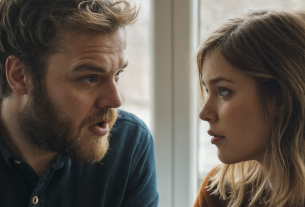Valentina Sergeyevna—my husband’s mother—set her cup down on the saucer with such force that the porcelain gave a plaintive clink.
“An empty apartment. Echoes roaming the corners.”
She swept the living room with a heavy, appraising look, like an inspector searching for cracks in the foundation. Her perfume—withered lilies she’d worn forever—filled the space, pushing the air out.
“Normal people already have children’s laughter at home, and what do we have?”
My husband, Vadim, put down his phone, which he’d been scrolling through with an air of great importance.
“Mom, stop it. We’ve talked about this.”
“Talked!” She snapped her head up. “You talked, yes—but what good are your talks? Seven years since the wedding! Seven!”
I kept quiet, studying the pattern on the wallpaper. It was my usual ritual—to turn into furniture until the storm passed. I knew every little branch in that pattern by heart. In seven years I’d memorized it completely.
Vadim sighed, playing at cosmic weariness. He loved that role—the suffering son caught between two women.
“Katya’s just… going through a phase right now. The doctors say we need to wait.”
A lie. Smooth, honed by years. A lie that had long since become part of our home, like the furniture or that wallpaper.
Valentina Sergeyevna turned her eyes on me. There was no sympathy in them. Only a cold, measured sentence.
“You’re barren, Katerina! We’ll never see grandchildren from you!”
She didn’t say it with malice. It came with a deep, hard-earned grievance, as if I had deliberately stolen something vital from her.
Vadim jumped up.
“Mom! I won’t let you speak to my wife like that!”
But his defense was as fake as the talk about the “doctors.” He wasn’t defending me. He was defending his little cozy world where none of it was his fault.
I stood up slowly.
“I think I’ll lie down. I’ve got a bit of a headache.”
Valentina Sergeyevna only pressed her lips together. She had won. Again.
I closed the bedroom door behind me and leaned my back against it. I didn’t cry. The tears had run out a couple of years ago, in a clinic corridor with scuffed walls that smelled of bleach and hopelessness.
Five years earlier. The reproductive specialist’s office.
A gray-haired doctor with thick-lensed glasses wasn’t looking at us, but at a sheet with the results of Vadim’s tests. He tapped it with his pen and said, indifferently, “Absolute.”
One word. Not “there’s a chance,” not “we need treatment.” “Absolute.”
I squeezed Vadim’s hand then, to support him. But he jerked his away as if my touch had burned him. His face went pale, almost gray.
He was silent for a long time in the car. Then he turned to me, and for the first time I saw not love in his eyes, but cold fear.
“No one must know. Do you hear me, Katya? Especially my mother. It will kill her. You know how she’s been waiting. Swear you won’t tell anyone.”
And I, blinded by love and pity for him, swore. I, his faithful stoic, agreed to carry this cross. His cross.
I walked down the hallway past a closed door. The nursery. We painted its walls a tender light-green seven years ago, right after the wedding. Now that room was a silent reproach. A monument to our lie.
That evening, Vadim came into the bedroom. He didn’t apologize for his mother. He never apologized.
“I’ve been thinking,” he began obliquely, examining his nails. “That room is sitting empty. I need a study to work in. A desk, a computer.”
He was talking about the nursery.
“It’s rational, you agree, don’t you? Why let the square meters go to waste?”
I looked at him and for the first time in a long while saw not the man I loved, but a stranger—a cold man talking about our shared dream like a nonperforming asset.
“You want to paint over the light-green walls, Vadim?”
He grimaced, as if I’d said something foolish.
“Katya, don’t start. We have to be realistic. Enough living on illusions.”
The next day he brought home paint samples. Five shades of gray. He spread them out on the kitchen table while I brewed coffee.
“Here, look. ‘Wet Asphalt’ or ‘London Fog’? Very stylish, in my opinion. Perfect for a study.”
He spoke as if we were discussing a new kettle. Casual. Final.
I set a cup in front of him.
“Vadim, let’s not do this. It’s not just a room. You remember.”
“Remember what, Katya?” He didn’t look up at me. “How naïve we were? Enough living in the past. Dreams change. I want a proper workspace. Period.”
Two days later, coming back from the store, I found a paint roller and a bucket in the hallway. Vadim hadn’t waited for my consent. He’d simply started a war.
I went into the nursery. A stepladder stood in the middle of the room. In the corner, shoved together, stood a lonely baby crib we had never dismantled. Our little white elephant.
Vadim wiped dust from its rail.
“We should sell it on Avito. Make a bit of money. Rational, right?”
His “rational” hit me across the face. Every time.
On Saturday, Valentina Sergeyevna arrived. Without calling. She brought a tape measure and a notebook.
“That’s right, Vadim dear! Long overdue! A man should work and earn money, not waste time on nonsense.”
She walked into the nursery like it was her own and briskly began measuring the walls. Her suffocating lilies mixed with the acrid smell of primer.
“We’ll put the desk here. Shelves for documents there. And you, Katya, why are you standing around? You could help. Or do you not care how your husband works?”
I went out onto the balcony for a breath of air. But it smelled of paint out there, too. My home was no longer mine. It was becoming alien, hostile territory.
I went downstairs just to get away. I wandered aimlessly through the streets until I stumbled upon a small café. By the window sat Nikita. A classmate I hadn’t seen in about ten years.
He smiled and waved.
“Katya? Is that you? It’s been ages!”
I sat down with him. We talked about nothing—work, the weather. He told me he’d been widowed a few years back and was raising his daughter alone. He spoke about her with such warmth and love that my heart ached.
“And you? How are you?” he asked.
Looking into his open, honest eyes, I suddenly realized how tired I was of lying. But habit was stronger.
“Fine. Everything’s fine.”
“You look tired,” he said simply—not with pity, but with concern. “Take care of yourself, okay?”
That simple conversation, that unexpected meeting, was a breath of fresh air in the suffocation of recent years.
When I got home, Vadim had already started painting. One of the light-green walls was half covered in a deathly gray. He was painting over our past. Carefully, methodically, inch by inch.
He turned, smiling.
“Well? I think it’s turning out great. Very businesslike.”
I said nothing. I just stared at the gray stripe spreading across the wall like gangrene. He expected tears, reproaches, a scene. But I was silent. And that silence, it seemed, frightened him more than any hysteria.
The next day I felt like a guest at the funeral of my own life. Vadim and his mother enthusiastically finished painting the walls. Their voices boomed in the empty room.
I washed dishes mechanically, went to the store, answered questions. I was there, but I was already gone.
The “last straw” didn’t fall loudly. It was almost imperceptible.
Vadim decided it was time to get rid of the crib. He began dismantling it with businesslike huffing and puffing. I stood in the doorway and watched.
When he removed the slatted base, a small, forgotten plush box was left on the floor. I had put it there myself many years ago.
He picked it up and casually brushed off the dust.
“Oh, what do we have here?”
He opened the lid. Inside, on a bed of cotton, lay tiny knitted booties I had made in our first year of marriage. Next to them—a ticket stub for the movie after which we decided we were ready.
Vadim snorted. He saw no relics in this. He saw junk.
“Imagine, it’s been there for years. We should throw it out—free up some space.”
He said it so simply. So rationally. And headed for the trash can by the door.
And in that moment something shifted. All the pain, all the humiliations, all the years of lies and silent endurance contracted into one icy point inside me. There was no longer any hurt, no self-pity. Only a cold, clear, unshakable calm.
I stepped forward and silently took the box from his hands. He looked at me in surprise.
“Katya? What’s wrong?”
I didn’t answer. I turned and went to our bedroom. Opened the wardrobe. Took out a duffel bag. I wasn’t throwing things in at random. I carefully packed only what was mine: a few blouses, jeans, underwear. A makeup bag. Documents. And the plush box.
Vadim came into the room. He still didn’t understand.
“Are you mad? Katya, they’re just old things. If you want, keep it, if it matters that much to you.”
He thought it was about things. He never understood.
The bag was almost empty. It turned out that in this home, in this life, almost nothing belonged to me.
I zipped it up and walked past him into the hall. Valentina Sergeyevna stepped out of the gray room, wiping her hands on a rag.
“Putting on a show again?” she said with contempt. “Ungrateful. Vadim’s working for the family, and she—”
I stopped at the front door. Turned around. Looked not at my husband, but straight into his mother’s eyes.
“Do you want to know why you still aren’t rocking a grandchild, Valentina Sergeyevna?”
She was taken aback by my tone. There was no familiar submissiveness in it.
“Ask your son. Only ask him to tell you the truth this time.”
I didn’t wait for a reply. I didn’t look at Vadim’s contorted face. I simply opened the door and stepped over the threshold. And for the first time in many years, I took a full breath.
I spent the first night in the cheapest hotel. I didn’t cry. I just lay there, staring at the ceiling, listening to the old fridge humming through the wall. The sound of emptiness was familiar to me, but this emptiness was different. It was mine.
My phone wouldn’t stop ringing. First Vadim—rage, threats, accusations. Then Valentina Sergeyevna—sobs, wails, curses. I didn’t answer once. I simply muted the sound.
In the morning, I called Nikita.
“Can we get coffee? I need to talk.”
In the same café, for the first time in seven years, I told the truth. All of it. He listened in silence, without interrupting. And when I finished, he didn’t pity me. He just said:
“You’re very strong, Katya. Strong for having endured it. And even stronger for leaving.”
He helped me find an apartment. Helped me move. He and his daughter Masha, a serious girl beyond her years, brought me a hot dinner in a container that first evening. They asked nothing in return.
The divorce was dirty. Vadim hired an expensive lawyer and tried to prove I was “emotionally unstable.”
That my leaving proved my inadequacy. He lied, looking the judge in the eye. His lie had become him. But I had the clinic documents I’d kept in silence all those years. He lost.
Gradually, my new life filled with sounds. Masha’s laughter when we made dumplings together. Music I put on in the mornings. The creak of the floorboards in my own apartment.
The three of us—Nikita, Masha, and I—spent a lot of time together. We went to the park, to the movies, just walked around. I saw how he looked at me, but he didn’t rush me. He let me breathe.
A year later, on an autumn evening as the three of us sat in my little kitchen, he took my hand.
“Katya, I love you. And Masha loves you. Be our family.”
And I said “yes.” Without fear. Without doubt.
Another year later, after hundreds of tests and consultations, a doctor in a bright, clean clinic smiled and said, “Congratulations, you’re having a boy.”
In the spring, Egor was born. Small, loud, with the same honest eyes as his father. My son. Proof that I had never been barren. What was barren was my life with a man who made me believe I was.
One day in the park I ran into a former neighbor. She told me Vadim had sold the apartment. He lives alone. Valentina Sergeyevna comes on weekends. Cooks, cleans. And cries.
I looked at my son sleeping in his stroller. I felt neither gloating nor pity. Only peace.
Five years later.
“Mom, look, I built a rocket!” Egor, who was about to turn five, proudly set a block construction on the kitchen table.
Beside him, his older sister Masha, ten, was focused on her sketchbook.
“Egor, rockets need stabilizers or they’ll fall. Here, let me show you.”
I smiled.
“It’s a great rocket, sweetie. And you’ve got the best aerodynamics consultant in the world.”
Nikita came into the kitchen and slipped an arm around my shoulders, peering over them at the pie I was pulling from the oven.
“Smells amazing.”
Our kitchen wasn’t stylish. It was alive. With magnets on the fridge, with Masha’s and Egor’s drawings taped to the wall, with the perpetual light mess that exists only where people live, not merely exist.
On the shelf among the cookbooks stood that very plush box. Now beside it lay a cast of Egor’s tiny foot and the first drawing Masha ever gave me. It had stopped being a symbol of pain. It had become a starting point.
On Saturday we went to a big mall. And there, by the display of an expensive watch store, I saw him. Vadim.
He was alone. Graying, with tired eyes. He looked at the chronometers with the same expression he once wore choosing shades of gray paint. Rational. Appraising. Buying a thing to fill a void.
Our eyes met. He recognized me. I saw confusion in his, a prick of something like pain, and then—the usual defensive mask of cold indifference. He turned away and walked off quickly.
I stayed where I was. I felt nothing. No anger, no triumph. Just a statement of fact.
“Katya? You okay?” Nikita touched my hand.
I turned to him, to Masha and Egor, who were already arguing over which store to go to first.
“Everything’s just wonderful. Come on, we have a very important family question to settle: fire truck or dollhouse?”
We left, laughing, and I didn’t look back. I didn’t need to know whether he ever told his mother the truth.
Their story ended the day I walked out the door. Mine was here.
And it was filled not with someone else’s anticipation of grandchildren, but with the laughter of my own children. And the walls in our home were bright with sunshine and love



